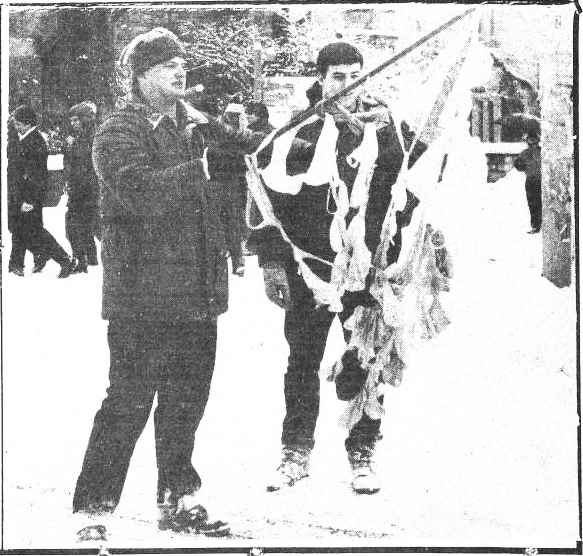
In an Aug. 30 letter to leaders of the Senate Judiciary Committee, female college classmates of Supreme Court nominee Brett Kavanaugh ’87 LAW ’90 testified to the judge’s respect for women, praising his character and his support for female athletics at Yale.
But in his first year of college, Kavanaugh joined an organization notorious for disrespecting women: the campus chapter of the Delta Kappa Epsilon fraternity.
A photograph that appeared in the Yale Daily News on Jan. 18, 1985, shows Kavanaugh’s fraternity brothers waving a flag woven from women’s underwear as part of a procession of DKE initiates marching across Yale’s campus. Kavanaugh does not appear in the photograph. But the portrait it paints of casual disrespect for women seems noteworthy in light of the explosive allegation by California psychology professor Christine Blasey Ford that Kavanaugh attempted to sexually assault her at a high school party almost 40 years ago.
In the 1985 photo, the DKE pledges — “fondly known as ‘buttholes,’” according to the caption — brandish a flag made of underwear and brassieres as they march outside Woodbridge Hall, Yale’s central administrative building. At the time, Bartlett Giamatti, the University’s president, was a former DKE brother himself.
Although the flag may seem shocking by today’s standards, the photograph appeared in 1985 under the tongue-in-cheek headline “DKE AT PLAY.” At the time of the escapades, Kavanaugh — who does not appear in the photo — was a sophomore, already inducted into the fraternity.
In a letter to the editor published in the News three days later, a Yale student, Rachel Eisler ’86, charged that DKE’s pledge antics “demean women.” She wrote that she approached one of the pledges carrying the flag to ask whether any briefs or jockstraps were affixed to the pole. “Well, I didn’t make it,” the pledge responded, according to the letter. He then said he doubted that any “guys’ stuff” would be woven into the flag.
“‘But hey,’” he told the female student, according to the letter. “‘Your panties might be here!”
Steve Gallo ’88, a member of DKE’s 1985 pledge class, said on Wednesday that the flag “was just somebody’s stupid idea” and that the underwear was “obtained consensually.”
During the fraternity’s “pledge week,” he recalled, the frat’s upperclassmen would send the new recruits out “for fun to talk to Yale women on their behalf.” Occasionally, he said, DKE brothers would send new recruits on “scavenger hunts” to find specific objects on campus.
“Pledges might ask for help from women they knew — or maybe the guy who sent them knew — to complete an item on the list,” Gallo said. “I am almost certain that is where any women’s undergarments would have come from … women people knew donating them willingly to play along.”
But in a comment on a post in the YaleWomen Facebook page, Jennifer Lew ’87, a classmate of Kavanaugh’s, recalled that DKE brothers would ransack women’s rooms while they were in class to collect undergarments. Another alumnus, Julie Klein ’87, described DKE as an “animal house.”
In addition to DKE, Kavanaugh also belonged to Truth and Courage, one of Yale’s secret societies for seniors. Among some students, the all-male club, which was popular with athletes, was known by the nickname “Tit and Clit.”
Truth and Courage fizzled out of existence in the early 2010s. But since Kavanaugh’s graduation in 1987, DKE’s reputation for mistreating women at Yale has only grown. Yale banned DKE from campus for five years in 2011 after videos circulated of fraternity recruits chanting “no means yes, yes means anal” in front of the University’s Women’s Center.
And this spring, the University launched an investigation into the fraternity’s sexual climate after reports in the Yale Daily News and Business Insider documented sexual assault allegations against more than half a dozen members, including the fraternity’s former president.
Kavanaugh does not appear to have spoken publicly about his time in DKE. But in a speech to the Yale Law School Federalist Society in 2014, he recounted “falling out of [a] bus onto the front steps of the Yale Law School at about 4:45 a.m.” after a night of bar-hopping in Boston, according to a partial transcript of the speech published in Mother Jones.
Not everybody at Yale in the 1980s remembers DKE as wild and misogynistic. Sam Chauncey ’57, a longtime Yale administrator, said this summer that “DKE was pretty tame back in Kavanaugh’s time.”
But “tame” was not the word that came to Eisler’s mind when she saw the DKE flag in 1985.
“I was totally shocked that something like that would happen at Yale,” recalled Eisler, who wrote the letter to the editor and now works as a high school English teacher in Maryland.
“Even when I describe going up to them and talking to them, I was asking them out of disbelief,” she said.
Hailey Fuchs | hailey.fuchs@yale.edu
Britton O’Daly | britton.o’daly@yale.edu







